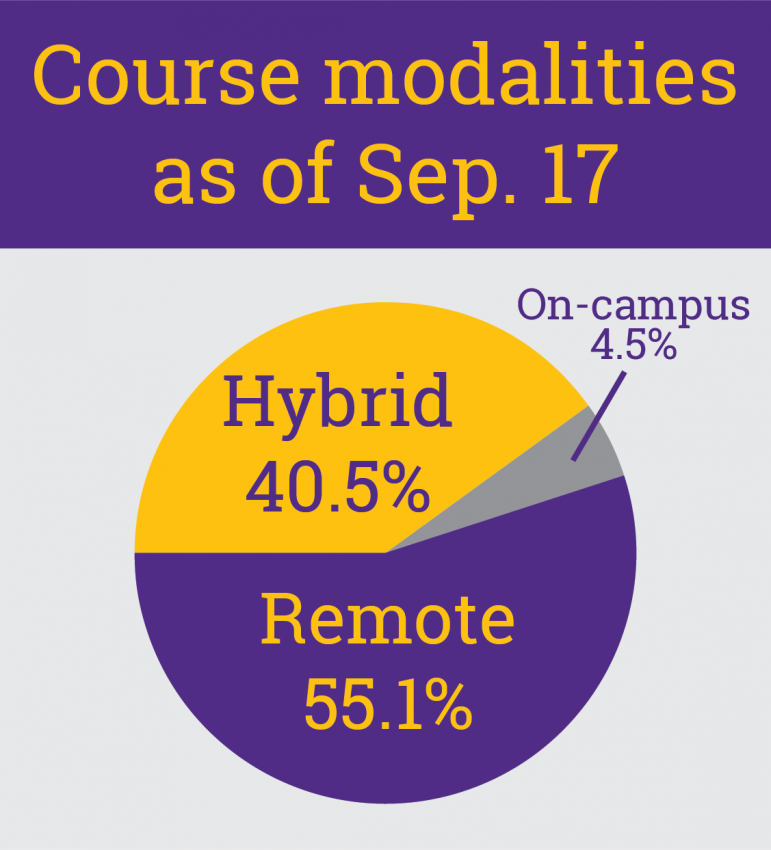
According to data provided by Dean of the College Marlene Sandstrom, 55.1 percent of all classes at the College this semester are currently listed as remote, while 40.5 percent are hybrid and the remaining 4.5 percent are in-person.
The College did not record ongoing trends, nor did it preserve statistics on class listings from July, making it difficult to determine exactly how the catalog has changed since it was first released. The College’s “Sneak Peek” catalog of 490 courses released midsummer included 48 percent hybrid, 45 percent remote and 7 percent in-person or multi-section courses.
In an all-campus email on Aug. 6, however, Sandstrom cautioned that “[a]n increasing number of faculty members (more than half so far) have informed us that they plan to teach remotely this fall,” and that “[s]ome faculty may decide to switch from hybrid teaching to a remote-only option after pre-registration — or even after the semester begins.” The data provided by Sandstrom indicate that at least some professors have in fact opted to switch from in-person to digital methods of instruction since then.
One of those professors is Visiting Assistant Professor of Environmental Studies April Merleaux, who originally listed her classes as hybrid but decided during the summer to formally switch to remote instruction.
“I started out hopeful about doing hybrid/in-person because I love being in the classroom and interacting with students, and I didn’t want to miss out on that,” Merleaux said. But as COVID-19 cases surged around the nation and in Massachusetts in the middle of the summer, she began to reconsider.
“There was just so much uncertainty at that point, and I felt that it would be better to start the semester in the way that I would be continuing it,” Merleaux said. “I didn’t want to have to switch modes mid-term. I also was in the midst of redesigning my classes, and it became increasingly clear that I could imagine designing an effective in-person or fully remote class, but hybrid posed too many logistical problems.”
Merleaux’s decision to switch her course listing to remote is reflected in the statistics provided by Sandstrom. However, other professors like Professor of Statistics Richard De Veaux have chosen to keep their classes listed as hybrid while still largely adhering to a remote format.
De Veaux decided early on to list his one lecture class for the semester, STAT 346: Regression Theory, as a hybrid course. But he began to rethink his decision after participating in an experimental hybrid class with other professors and Office of Information Technology staff.
“I found it to be really lacking in several key areas,” De Veaux said. “I couldn’t really understand my partner through the mask, and the remote people had trouble understanding what was going on in the room besides the slides that they could see.”
Thus, while his class remains nominally hybrid, De Veaux has shifted nearly all of its operations online. “Preliminary feedback seems to agree that remote is actually working better than hybrid would have for this course,” he said. “I do plan to meet with my on-campus students from time to time just to get to know them better and have one-on-one Zoom sessions with my remote students for the same purpose.”
De Veaux is far from the only professor with a mixed approach that would not be registered in the College’s official statistics. Some professors only hold in-person sessions of their hybrid classes once every one or two weeks; others have divided their hybrid classes into in-person and remote sessions, thus essentially turning them into multi-section courses.
Still others, like Assistant Professor of Computer Science Shikha Singh, have transitioned temporarily to remote instruction due to unforeseen circumstances. Singh, who had to unexpectedly travel out of state, has moved her hybrid class online until she is finished quarantining.
According to Singh, the transition was not a particularly difficult one. “I had already had a backup plan for teaching the class remotely as it was always a possibility if health conditions worsened,” she said.
Both Singh and Merleaux indicated that the College has been helpful in their transitions. “The College has been SO supportive,” Merleaux wrote in an email to the Record. “As I listen to colleagues who teach at other institutions, I am ever grateful for the grace with which Williams has adapted.”
“While I do miss being in person and on campus,” she added, “this feels like the right decision.”














